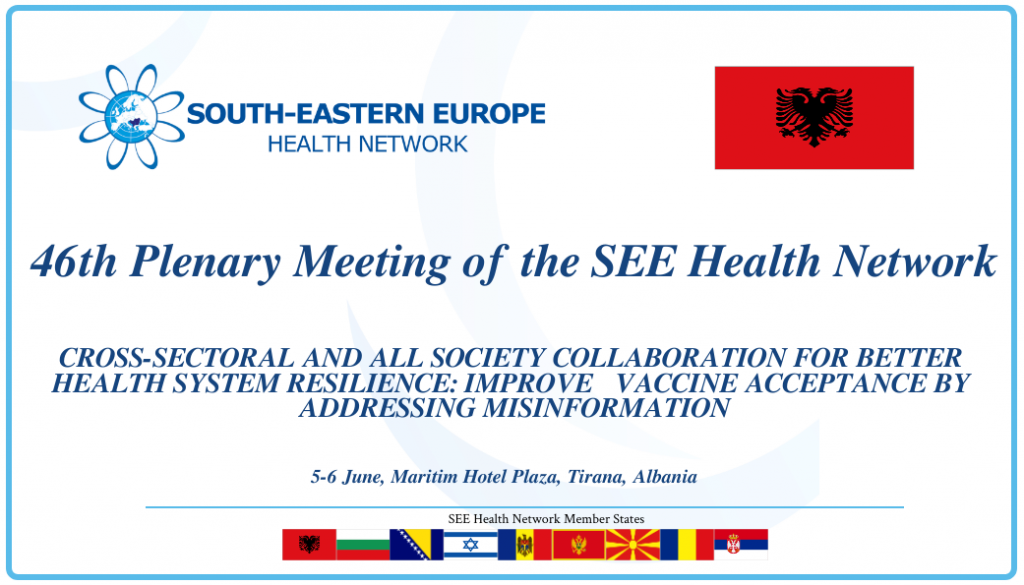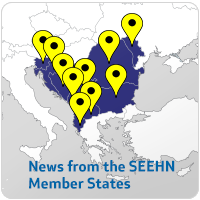The South Eastern Europe Health Network (SEEHN) successfully convened its annual Plenary Meeting, bringing high-level representatives from member states, diplomatic corps and international partners together.
The 46th SEEHN Plenary Meeting, held on 5-6 June in Tirana, Albania, focused on the central theme of “Cross-Sectoral and All Society Collaboration for Better Health System Resilience: Improve Vaccine Acceptance by Addressing Misinformation.”
In her opening remarks, Dr Dasic, head of SEEHN Secretariat, expressed her appreciation for the support of the Albanian Presidency in navigating emergency efforts through the Covid-19 pandemic. She also emphasized that addressing vaccine acceptance and misinformation required a comprehensive, multi-pronged approach, underscoring the role of cross-sectoral collaboration and inclusivity. Moreover she highlighted that the pandemic and the nearby-armed conflict taught us that social compact and solidarity are the world-building blocks for sustainable development and growth. Yet, it is also a matter of prioritizing health high on the political agenda.
Dr. Svetlana Nicolaescu, SEEHN EX COM Chair, also focused on the value of cooperation and solidarity to tackle challenges ahead. Dr. Nicolaescu pointed out in her opening address that our solidarity is more than a value. It is a lived truth, and we must remain united, collaborate, support each other, strive for community engagement and have our politicians on board to foster cross-border collaboration and that the best way to move forward is to ensure health for all.
The event provided a platform for robust discussions, sharing of best practices, and formulating strategies to enhance vaccine acceptance and combat misinformation across the SEE region.
During the dedicated sessions, representatives shared their experiences and achievements in promoting vaccine acceptance while addressing the detrimental effects of misinformation.
At the same time, experts from various fields, including health communication, epidemiology, and social sciences, delivered insightful presentations, underscoring the importance of cross-sectoral cooperation and active involvement of all segments of society.
Participants emphasized the significance of collaboration among governments, healthcare professionals, civil society organizations, media outlets, and other stakeholders to address vaccine hesitancy and counter misinformation effectively.
Discussions centred on developing and implementing effective health communication strategies to counter vaccine misinformation. Experts emphasized the need for clear, accurate, and culturally sensitive messaging tailored to different population segments and the utilization of digital platforms and social media to disseminate accurate information and combat misinformation effectively.
Member states shared successful experiences in strengthening vaccination programs, including targeted community engagement initiatives, training healthcare workers on vaccine communication, and leveraging local influencers and opinion leaders to increase vaccine acceptance. The discussions also addressed access to COVID-19 vaccination for migrants and increasing vaccine confidence among vulnerable populations.
Participants emphasized the importance of robust surveillance and monitoring systems to promptly identify and address emerging vaccine-related concerns. Strengthening these systems, in collaboration with international partners, will enable rapid detection and response to misinformation campaigns and other threats to public health.
SEEHN Plenary Meeting also advanced strategic governance and outlined future objectives for the Southeastern Europe Health Network. Key highlights included the signing of the Belgrade Pledge, strategic planning for the next four years, and the presentation of the SEEHN Presidency Report and the SEEHN Road Map.
The meeting outlined the strategic priorities of SEEHN for the upcoming four-year period that would support member states and partners to effectively align their efforts and resources.
The SEEHN Presidency Report, presented during the meeting, highlighted the accomplishments and challenges faced by the current Presidency. It showcased the progress in implementing regional initiatives, strengthening cooperation among member states, and improving health system governance. The report also emphasized the importance of collaboration with partners and stakeholders to achieve sustainable health outcomes in the SEEHN region.
During the session dedicated to Member States representatives, the participants approved the establishment of a RHDC Centre for Nursing and Midwifery to be hosted by the Order of Nurses and Midwives of Romania.
A dedicated and competent regional body is essential to advance nursing and midwifery in the region and beyond as we strive to enhance healthcare systems, improve patient outcomes, and address the evolving challenges in healthcare delivery,.
The SEEHN Plenary Meeting concluded with a collective commitment to implement the strategies and recommendations formulated during the event. The meeting witnessed unprecedented engagement and dedication from all participants, highlighting their commitment to safeguarding public health and strengthening health systems in the SEE region.






